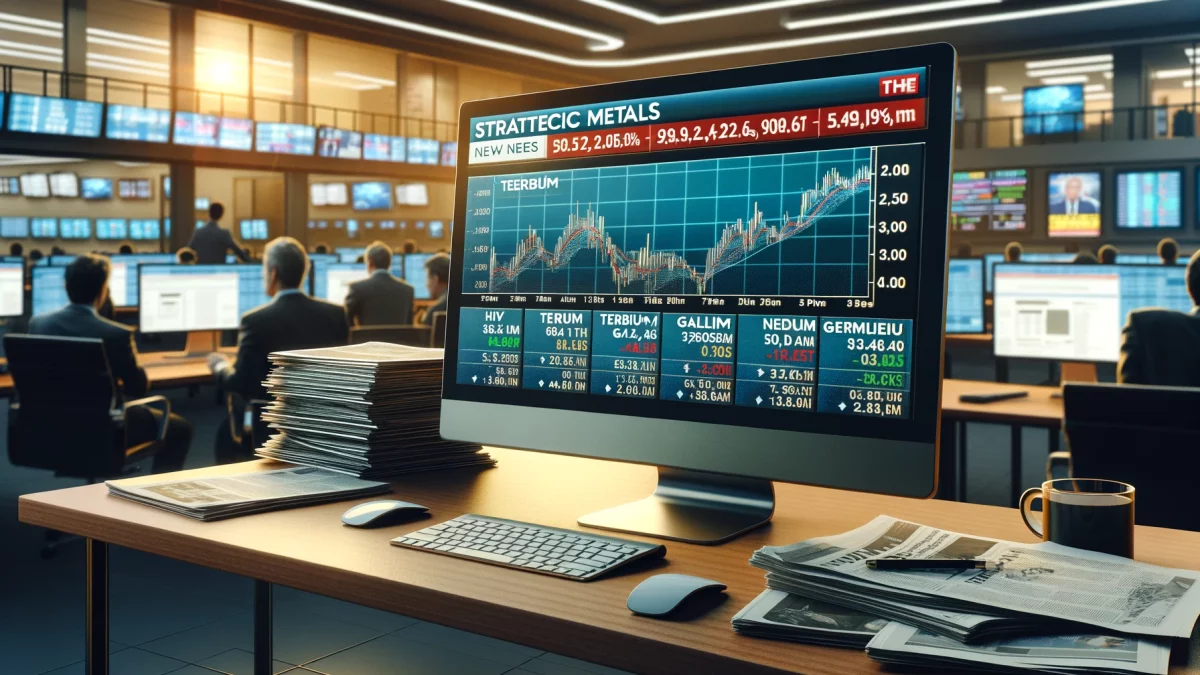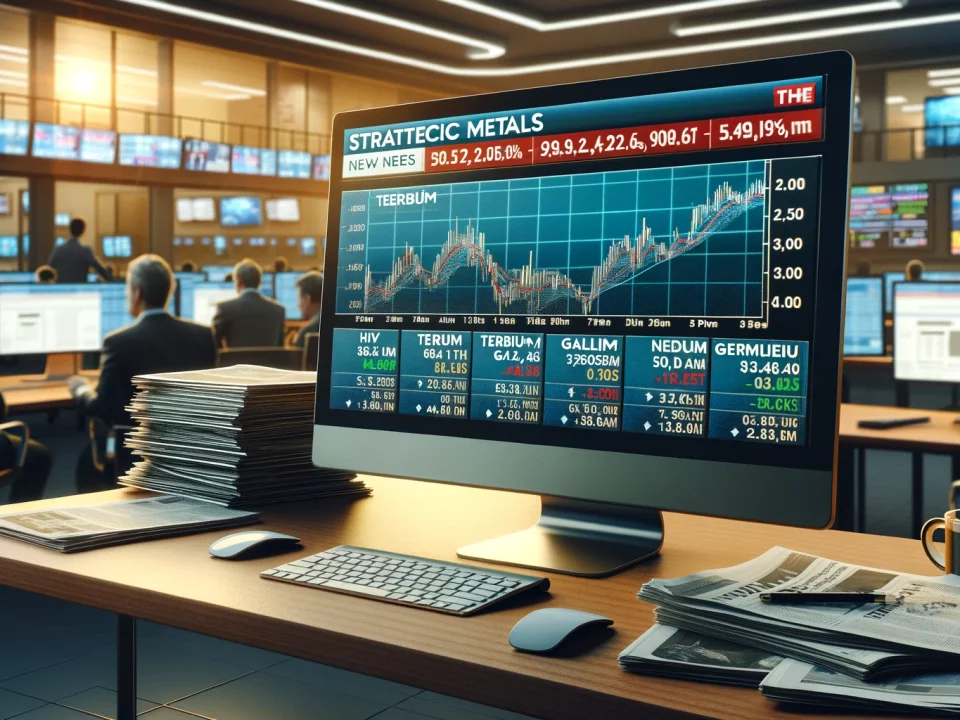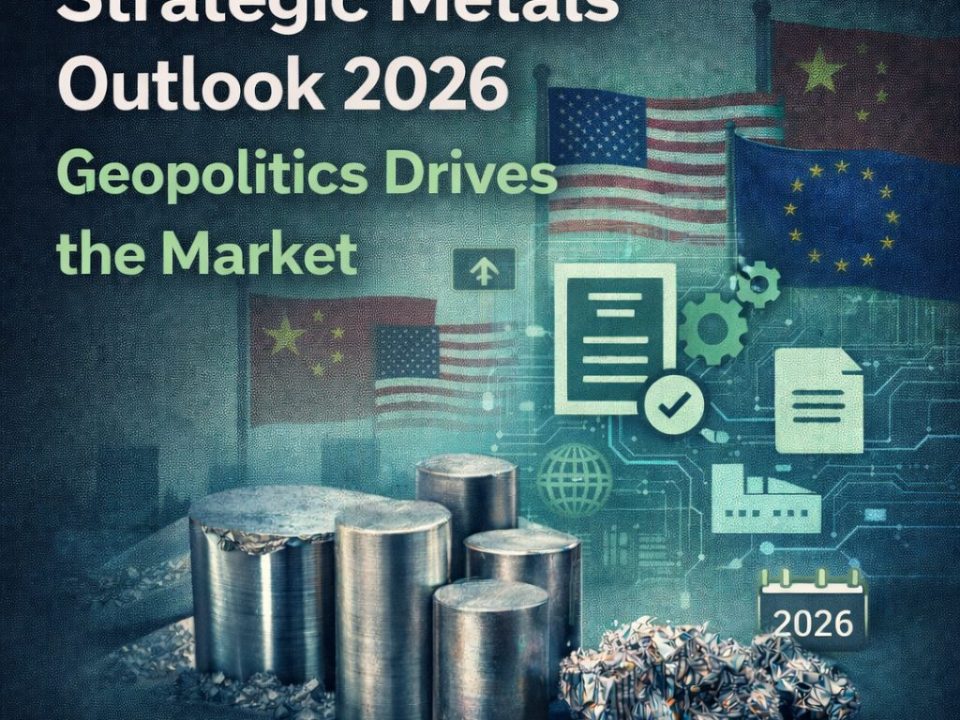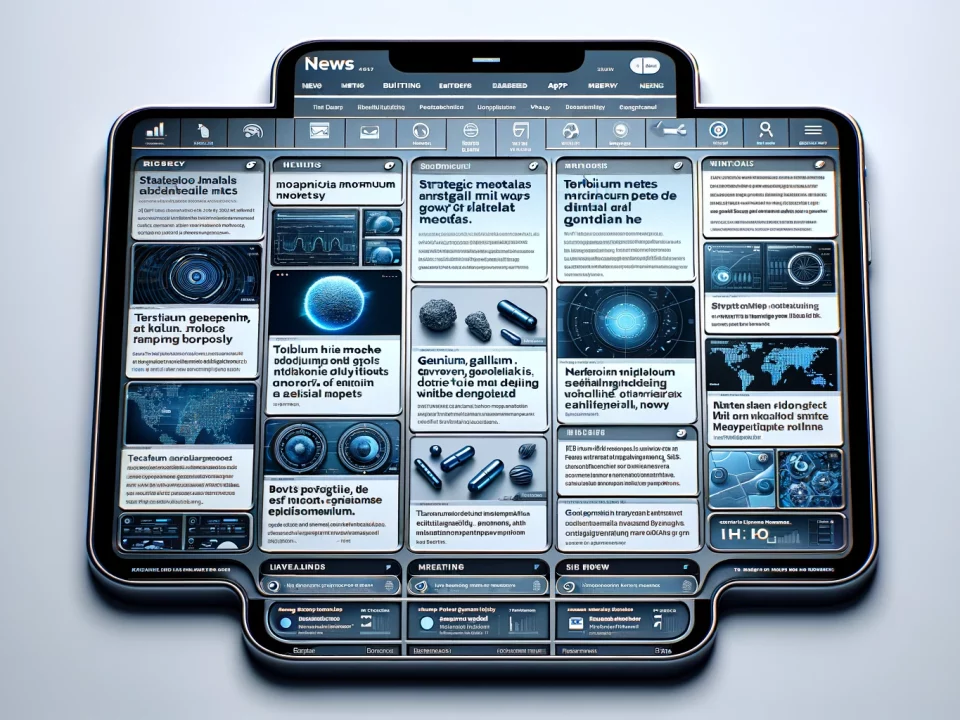
Weekly News Review November 25 – December 1 2024
December 1, 2024
Weekly News Review December 3 – December 15 2024
December 15, 2024CHINA RESTRICTS EXPORT OF GALLIUM AND GERMANIUM TO THE UNITED STATES:
Exports of so-called dual-use goods or items with civil and military applications are prohibited, effective immediately—specifically gallium, germanium, and antimony.
China has imposed restrictions on the export of certain critical minerals to the United States, the Chinese Ministry of Commerce announced Tuesday. Specifically, exports of dual-use items—materials with both civilian and military applications—are now banned on grounds of national security. This includes gallium, germanium, antimony, and superhard materials.
The ministry also stated that stricter reviews of end-users and end-uses will be required for graphite dual-use items shipped to the U.S. The measures are effective immediately.
Besides being used for civil purposes in various industries, gallium and germanium have military applications, such as lasers and night vision technologies. Antimony, on the other hand, is mainly used as an alloy component to harden soft metals. In the form of antimony trioxide, it is also used as a flame retardant. Both uses have applications in military fields.
The move comes shortly after the United States tightened China’s access to state-of-the-art memory chips and chip-making technology on Monday, amid an ongoing trade dispute between the two countries.
Exports Were Restricted in the Past Already:
However, despite the announcement of export restrictions starting today, data from the Chinese customs authority shows that the last shipment of gallium and germanium to the United States occurred in June 2023, before export controls on these two critical technology metals were implemented in China. Exports to other countries are ongoing. Since August 2023, companies wishing to ship gallium or germanium abroad must apply for licenses and provide extensive background data on the recipient. The People’s Republic then also cited national security as the reason for the measure.
In comparison, the last shipment of unwrought antimony and antimony oxides to the U.S. was just a few months ago, in September. Only minor amounts of lead alloys with antimony contents were exported in October. In August this year, the metal and related products joined gallium and germanium on the list of export-controlled goods.
CHINA PUSHES FOR DEEP SEA MINING:
Sample collection and environmental studies planned in the Pacific.
While Norway has temporarily shelved plans for undersea mining (as we reported), China is advancing the controversial initiative. According to the Malaysian newspaper The Star, Beijing Pioneer Hi-Tech Development Corporation plans to begin testing deep-sea mining operations in the Pacific Ocean next August.
The state-owned company holds exclusive exploration rights in two areas near Japan’s Minami-Torishima coral island. These sites are believed to contain significant deposits of rare earth elements, as highlighted in a 2018 study.
As part of the exploration, research will also focus on studying the environmental impact of extracting raw materials from the deep sea. Another state-owned enterprise, China Minmetals Corporation, reportedly plans a similar project in international waters near Hawaii.
However, commercial resource extraction in international waters is currently prohibited due to the lack of binding regulations from the International Seabed Authority (ISA).
If mining were to be permitted under such regulations in the future, Chinese companies would likely have a substantial advantage over other nations in the region due to their preparatory efforts. This situation is not without irony, as deep-sea mining is often seen as a means of reducing dependency on China, the global heavyweight in raw material production.
NORWAY SUSPENDS DEEP SEA-MINING: FOR NOW –
The country’s Social Left Party blocked plans for seabed exploration in return for supporting the minority government’s budget.
Norway will not announce any licenses for deep-sea mining or exploration activities in 2024 or 2025, the country’s Social Left Party said in a statement. The announcement comes amid negotiations about next year’s fiscal budget.
According to the party, it blocked the deep-sea mining plans in return for supporting the minority government’s budget plans. However, Prime Minister Jonas Gahr Stoer emphasized in a TV interview that this would only be a postponement, France 24 reports.
Norway was long seen as spearheading deep-sea mining efforts. Parliament gave the green light to open an area in the North Atlantic for mineral exploration in January. Then, in June, the north European country took the next step, publishing a concrete proposal for the first licensing round with plans to award the first concessions in 2025. Norway will hold elections next September; until then, plans are on hold.
Meanwhile, a few thousand kilometers to the East, India forges ahead with plans of its own to mine critical minerals in its seabed. Last week, the Ministry of Mines held the country’s first-ever auction of offshore mineral deposits.
The auction comprised 13 blocks spread across the Arabian and Andaman Sea, consisting of construction sand, lime mud, and polymetallic nodules.
NIGERIA AND FRANCE PLAN JOINT MINING PROJECTS:
Supply chains for critical raw materials are to be strengthened, with a particular focus on the secondary utilization of former Nigerian mines.
Nigeria and France are taking steps to collaborate in the extraction and processing of critical minerals. According to Voice of Nigeria and other sources, a memorandum of understanding has been signed to enhance the entire value chain of these resources, from mining to processing, while also prioritizing sustainability and environmental responsibility.
The agreement, signed by Dr. Dele Alake, Nigeria’s Minister for Solid Minerals, and Benjamin Gallezot, France’s Interministerial Delegate for Strategic Metals and Minerals, was part of Nigerian President Bola Tinubu’s state visit to France.
It aims to foster joint mining and processing projects, reduce the environmental footprint of mining activities, and rehabilitate former mining sites in Nigeria. This includes exploring secondary mining, which utilizes remnants like waste dumps and mine water as new sources of raw materials.
The partnership is expected to attract French investors and is integral to Nigeria’s efforts to make its mining sector globally competitive. While Nigeria’s economy is currently heavily reliant on oil exports, the country seeks to diversify by tapping into its reserves of metals such as lithium, nickel, and gold.
Africa’s Resource Wealth: A Focus for Western Nations and China:
Resource-rich African nations are becoming increasingly critical for Western countries seeking to meet rising demand while reducing dependency on Chinese imports. German Chancellor Olaf Scholz recently visited Nigeria and Ghana, highlighting the potential for collaboration on raw materials—a topic also under discussion at the ongoing German-African Business Summit in Kenya.
Meanwhile, U.S. President Joe Biden is visiting Angola to advance the Lobito Corridor, a proposed railway linking Angola, Zambia, and the Democratic Republic of Congo.
This joint EU-U.S. infrastructure project is seen as a counterbalance to China’s Belt and Road Initiative, which aims to bolster China’s global influence and secure access to Africa’s vast mineral resources.
CANADA AND INDONESIA BOLSTER ECONOMIC TIES:
Comprehensive Economic Partnership Agreement eliminates trade barriers and could give Canada access to critical minerals in Southeast Asia.
The governments of Canada and Indonesia signed the Comprehensive Economic Partnership Agreement in Jakarta on Monday, according to Reuters and other news outlets. Under the partnership, the countries will deepen their economic ties by eliminating trade barriers and facilitating joint investments. In addition, Canada hopes to gain access to Southeast Asian supply chains, including those for critical minerals.
Amid the global race for critical minerals, Indonesia is emerging as a potential alternative to industry leader China, drawing significant international interest. According to the United States Geological Survey, Indonesia is the world’s leading nickel producer, accounting for half of the total output.
In addition, the country is the world’s third-largest tin miner and produces various other critical minerals. Since 2021, the Indonesian government has introduced several export bans on unprocessed raw materials, aiming to boost domestic processing, foster value-added industries, and attract foreign investment to strengthen the country’s economic development.
In September, Indonesia and the United Kingdom agreed to collaborate on critical minerals, including working together on sustainable upstream and downstream processing (we reported). Already in 2023, U.S. President Joe Biden met with his then-counterpart, Indonesian President Joko Widodo, to elevate their relations.
The two also discussed a possible critical mineral partnership.
USA: EVELUTION ENERGY SECURES $200 FOR ARIZONA FACILITY –
Evelution Energy has secured a Letter of Interest (LOI) from the Export-Import Bank of the United States for a loan of up to $200 million to support the construction and operation of its planned cobalt processing plant in Yuma, Arizona.
The company states that the facility will be the first and largest solar-powered cobalt processing plant in the United States, expected to be fully operational in 2027. The plant will produce cobalt sulfate and cobalt metal from cobalt hydroxide and other intermediates and is anticipated to supply between 20% and 40% of the projected cobalt demand in the United States.
In April, Evelution Energy inked a Letter of Intent with resource giant Glencore over the supply of cobalt hydroxide feedstock for the planned facility. Already in October 2023, the company finalized a similar agreement with the Eurasian Resources Group.
Cobalt is mainly used in battery applications as a cathode material. Other applications are in the chemical industry, as well as the production of superalloys, for example, for aircraft gas turbine engines. In 2023, 78 percent of the world’s refined cobalt was produced in China, with no commercial-scale processing capacities in the U.S., according to the Cobalt Institute.
The Export-Import Bank’s initiative is the latest move by the U.S. to change this. In August, the Department of Defense awarded $20 million to Canadian company Electra Battery Materials Corporation to advance the construction of its planned cobalt sulfate facility in Temiskaming Shores, Ontario, Canada.
STRATEGIC METALS: UZBEKISTAN TARGETS $1 BILLION IN INVESTMENTS IN 2025 ALONE –
The Central Asian country holds vast reserves of critical minerals and is among the leading gold, silver, and copper producers.
Uzbekistan seeks to expand its mining and mineral sector. On Monday, President Shavkat Mirziyoyev reviewed the progress the mining and metallurgical industry has made in the last few years and outlined the plans for 2025. According to the Uzbek government, production in the sector has grown 1.5 times over the past seven years.
In addition, the industry has attracted $9.5 billion in investments since 2020, which enabled the launch of 15 major projects. To continue this development, the Central Asian country aims to attract $1 billion in additional investments next year. However, Mirziyoyev stressed the need for large-scale transformations in production facilities to enhance their competitiveness in global markets.
According to the U.S. Geological Survey, Uzbekistan is the world’s fourth-largest producer of rhenium, a transition metal essential for manufacturing superalloys. The country is also a major global producer of gold, cadmium, molybdenum, and uranium while boasting substantial reserves of critical minerals like copper, silver, tungsten, and zinc. Additionally, Uzbekistan aims to expand its production of rare earth elements, vital for technologies such as permanent magnets.
In September, the United States inked a Memorandum of Understanding with the country to intensify cooperation in critical minerals. In September, Germany followed suit; Chancellor Olaf Scholz met with President Mirziyoyev and agreed to strengthen cooperation on critical raw materials, including mining and processing.
SOUTH KOREA AND KYRGYZSTAN JOIN FORCES ON STRATEGIC METALS AND ENERGY:
Central Asia’s mineral resources are becoming increasingly relevant to South Korea’s high-tech industry.
South Korea and Kyrgyzstan have agreed to strengthen bilateral relations and enhance cooperation in energy and critical minerals. Kyrgyz President Sadyr Japarov and his South Korean counterpart Yoon Suk Yeol formalized the partnership by signing a Memorandum of Understanding on Tuesday, according to Yoon’s office.
The two nations also forged a comprehensive strategic partnership to boost collaboration in trade, investment, supply chains, climate change, and other fields. Japarov is currently on an official visit to South Korea.
Central Asia Could Fuel South Korea’s High-Tech Industry:
South Korea is home to some of the biggest players in the semiconductor and automotive industries but lacks the necessary critical minerals within its borders. The East Asian country largely depends on imports from China but is looking to diversify its supply chains. Central Asia plays a central role in this. In June, Yoon announced the “K-Silk Road” regional strategy that seeks to connect the mineral resources of Central Asia with South Korea. The meeting with Kyrgyz President Japarov is now the fourth summit Yoon held with leaders of Central Asian nations, following his roundtrip to Turkmenistan, Kazakhstan, and Uzbekistan in June.
AUSTRALIA COMMITS TENS OF MILLIONS TO SUPPORT RARE EARTHS INDUSTRY:
Iluka secures additional support of up to USD 305 million as processing plant construction costs rise.
The Australian mining company Iluka Resources has secured additional government support for the construction of its Eneabba rare earth refinery. According to an announcement by the Australian government on Friday, up to USD 305 million in funding will be provided for the project. Financial Times reports that this decision follows over a year of negotiations. The original 2022 loan amount was adjusted due to increased estimated construction costs.
The partnership aligns with the government’s “Future Made in Australia Act,” which aims to promote key industries such as critical minerals and clean energy, Iluka stated in a release (PDF). The additional financing is contingent upon securing corresponding offtake agreements.
Refining Highly Sought-After Heavy Rare Earths Also Planned:
Eneabba is set to become Australia’s first refinery capable of producing both light and heavy rare earths. The latter are considered particularly critical due to their rarity and the complexity of their extraction processes. At the same time, they are highly in demand for technologies like wind power and electric mobility, primarily in the form of permanent magnets.
In addition to processing raw materials from Iluka’s own mines, Eneabba will also be open to other domestic companies. Commissioning is planned for 2027, although the project was originally slated to begin operations next year.
Resource-rich Australia is increasingly positioning itself as an alternative supplier of raw materials to its Western partners, challenging industry leader China. The government has already provided substantial support to the mining sector, including the construction of another rare earth refinery, run by Lynas, which is already in operation. Australian Resources Minister Madeleine King described the promotion of the industry as a “national mission,” while emphasizing that success also depends on long-term foreign investments.
EUROPE: LONG AWAITED FREE TRADE AGREEMENT WITH SOUTH AMERICA TO BE SIGNED:
A quarter-century after initial discussions about a free trade agreement between the European Union and the Mercosur nations (Argentina, Brazil, Paraguay, and Uruguay), the initiative reached its final stage today, Friday, in Montevideo. In the Uruguayan capital, EU Commission President Ursula von der Leyen held final talks with her counterparts Lula, Milei, Peña, and Lacalle Pou.
The agreement reached today still requires approval from the EU Council, the European Parliament, and the national parliaments of the 26 member states. Opposition to the deal exists in France, where farmers fear competition from cheaper agricultural products from South America. Italy had also previously announced its intention to reject the agreement.
Supporters of the deal, however, hope for significantly improved access to critical raw materials. Argentina boasts large reserves of lithium, a key battery metal, while Brazil is home to promising deposits of rare earth elements.
Bolivia, which joined the Mercosur bloc in 2024, also seeks to develop its mining of this group of raw materials. However, it will not initially be part of the agreement with the EU. Bolivia holds the world’s largest lithium reserves, which have also attracted China’s interest. Recently, a contract was signed with a Chinese company to build processing facilities.
In Brazil, meanwhile, companies from the People’s Republic are expanding their investments in mining, securing access to critical resources. This includes rare earth mining, as highlighted by the late-November acquisition of Mineração Taboca by the China Nonferrous Metal Mining Group. For Europe, therefore, the free trade agreement is not an automatic path to swiftly diversify its raw material supply chains away from China.






